Far-right parties on the rise across Europe
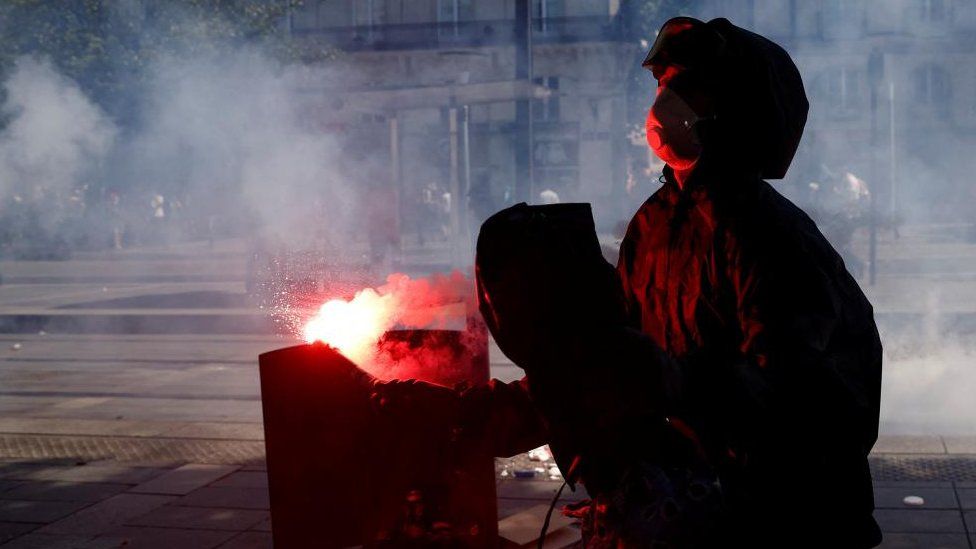
France is on a knife edge.
Holding its breath as unrest spreads across the country, bursting out of the banlieues - the often socially-neglected suburbs - after the fatal shooting this week of a 17-year-old from a French-Algerian family by police near Paris.
These types of riots are not unheard of in France. But the intensity of feeling taking hold of the country, whether amongst those sympathising with the police or with the banlieues and the victim's family - hasn't been witnessed in France since summer 2005.
And while President Macron visibly struggles to get the situation under control, his political nemesis on the far-right - Marine Le Pen - with her tough-on-security, anti-immigration message - may well end up benefitting in the polls.
Look around Europe right now - north, south, east and west - and you see far-right parties of different flavours - nostalgic nationalist, populist nationalist, ultra conservative with neo-fascist roots and more - enjoying a notable resurgence.
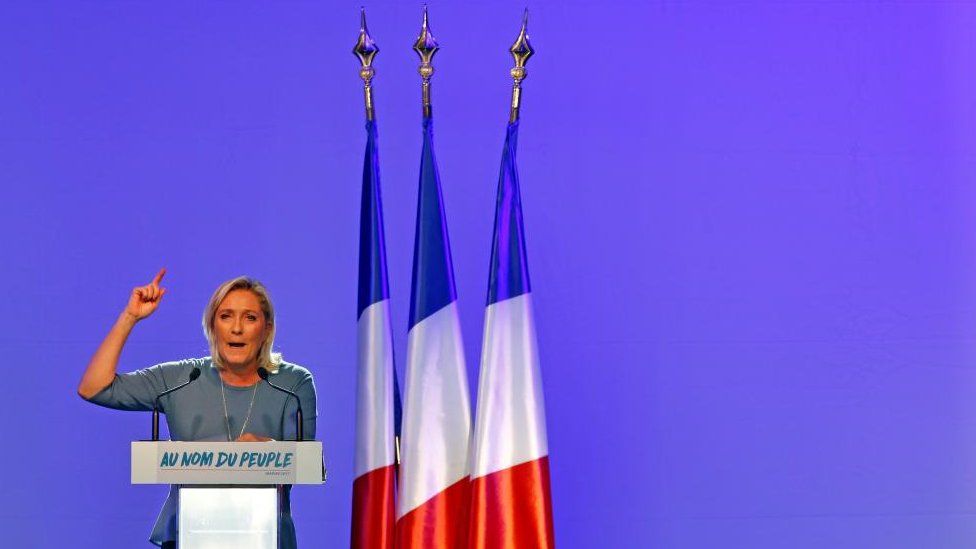 REUTERS
REUTERSOld taboos dating back to Europe's devastating 20th Century war against the Nazis and fascist Italy - meaning most voters felt you shouldn't vote ever again for the extreme right and mainstream political parties refused to collaborate with far-right groupings - are gradually being eroded.
I was living in Vienna back in 2000 when the centre-right first jumped into a coalition government bed with the far-right Freedom Party. It made headlines the world over. The EU even slapped Vienna with diplomatic sanctions.
Now, the EU's third largest economy, Italy, is run by Giorgia Meloni, head of a party with neo-fascist roots. In Finland, after 3 months of debate, the far-right nationalists The Finns recently joined the coalition government.
In Sweden the firmly anti-immigration, anti-multiculturalism Sweden Democrats are the second largest party in parliament, propping up the right-wing coalition government there.
In Greece last Sunday three hard-right parties won enough seats to enter parliament, while in Spain, the controversial nationalist Vox Party - the first successful far-right party in Spain since the death of fascist dictator Francisco Franco in 1975 - outperformed all expectations in recent regional elections.
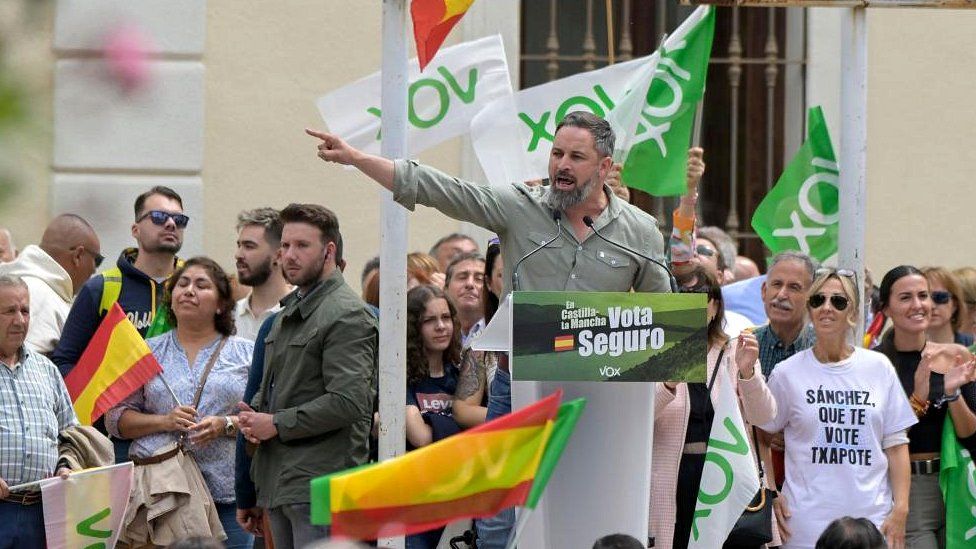 JESUS MONROY/EPA-EFE/REX/SHUTTERSTOCK
JESUS MONROY/EPA-EFE/REX/SHUTTERSTOCKThere's talk about them possibly forming a coalition government with the conservatives after national elections in three weeks' time.
Then there are the ultra-conservative, authoritarian-leaning governments in Poland and in Hungary.
The list really does go on and on.
Including even Germany, still so sensitive about its fascist past.
Polls there now put the far right AfD just ahead of, or neck and neck with, Chancellor Scholz's Social Democrats (SPD). Last weekend an AfD candidate won a local leadership post for the first time. The SPD called it "a political dam-breaker".
So what's happening? Are millions upon millions of European voters really swerving far-right? Or is this more of a protest vote? Or a sign of the polarisation between urban liberal voters and the conservative rest? And what do we mean anyway when we describe parties as 'far-right'?
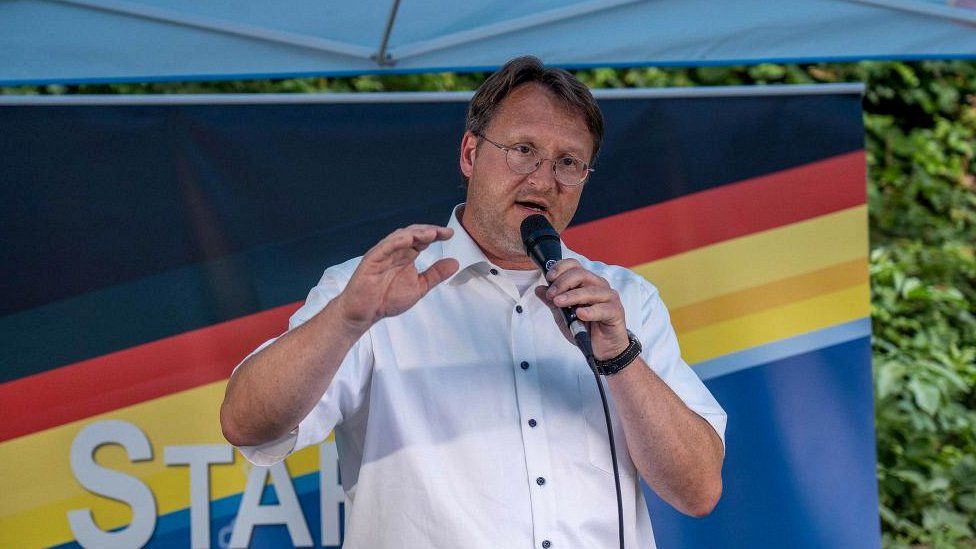 FERDINAND MERZBACH/NEWS5/AFP
FERDINAND MERZBACH/NEWS5/AFPLook at how hard-line some mainstream politicians can sound, especially before elections, when it comes to immigration - take centre-right Dutch Prime Minister Mark Rutte, or security - I'm looking at you, self-described centrist Emmanuel Macron.
Mark Leonard, director of the European Council on Foreign Relations says we're looking at a huge paradox.
On the one hand, many a mainstream politician has in recent years grabbed slogans or stances from the far-right, hoping to rob them of their supporters. But by doing so they help make the far right seem more mainstream.
While at the same time, a number of far-right parties in Europe have intentionally moved more towards the political centre, hoping to entice more centrist voters.
Take attitudes towards Russia for example. A large number of parties on the far-right - like The League in Italy, Marine Le Pen of France and Austria's Freedom Party Far had traditionally close ties to Moscow.
That became more than awkward following Vladimir Putin's full-scale invasion of Ukraine, leading to party leaders to change their rhetoric.
Mark Leonard cites far-right relations with the EU as another example of their 'centrification'.
You may remember, after the UK's Brexit vote in 2016 that Brussels feared a domino effect - Frexit (France leaving the EU), Dexit (Denmark leaving the EU), Italexit (Italy leaving the EU) and more.
Many European countries had deeply Eurosceptic populist parties doing well at the time but over the years those parties have felt obliged to stop agitating to leave the EU or even its euro currency.
That seemed too radical for a lot of European voters.
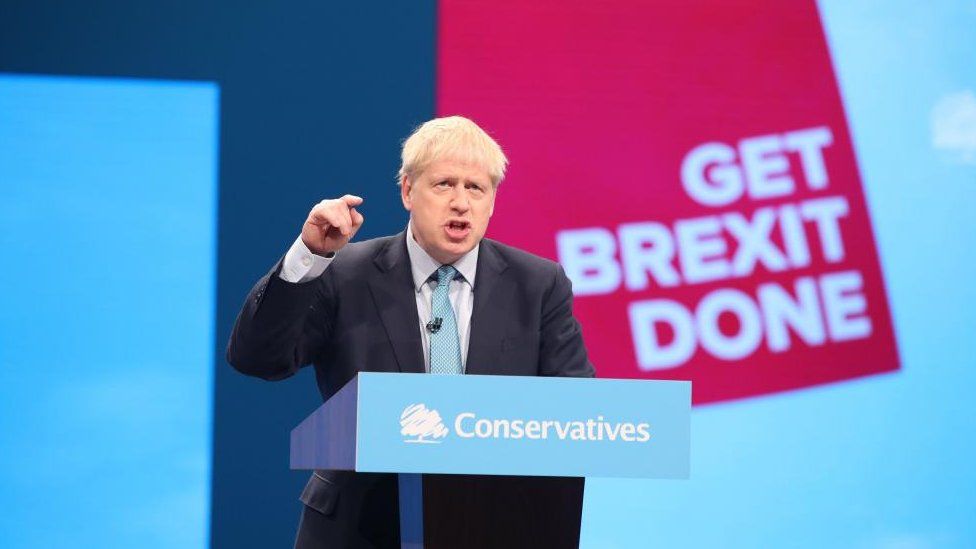 PA MEDIA
PA MEDIAThey looked at the social and political - never mind the hotly-debated economic impact - Brexit had in the UK and many concluded that exiting the EU would cause further destabilisation in a world that already feels very volatile.
Think: Covid pandemic, living next door to aggressive, unpredictable Russia, worrying about China, struggling with soaring living costs - with millions of European families still suffering the after-effects of the 2008 economic crisis.
Polls suggest the EU is more popular amongst Europeans at the moment than it has been for years.
And so far right parties now speak about reforming the EU, rather than leaving it. And they're predicted to perform strongly in next year's elections for the European parliament.
Paris-based Director of Institut Montaigne's Europe Programme Georgina Wright told me she believes the far-right renaissance in Europe is largely down to dissatisfaction with the political mainstream. Currently in Germany, 1 in 5 voters say they're unhappy with their coalition government, for example.
Wright said many voters in Europe are attracted by the outspokenness of parties on the far-right and there's tangible frustration that traditional politicians don't appear to have clear answers in 3 key areas of life:
- Issues linked to identity - a fear of open borders and an erosion of national identity and traditional values
- Economics - a rejection of globalisation and resentment that children and grandchildren aren't assured a better future
- Social justice - a feeling that national governments are not in control of the rules that govern the lives of citizens
You can see these issues bleeding into the debate about green energy in Europe too.
In the Netherlands this year, the right-wing populist Farmer-Citizen Movement made headlines by grabbing the largest number of seats of any party in the upper house of parliament after provincial elections.
In France, Emmanuel Macron was faced by so-called yellow vest protesters, including far-right groupings, when he tried to raise petrol prices in an attempt to put people off travelling by car.
While in Germany, public concern and anger about finances is holding back the Green Party sitting in government from introducing environmental reforms it promised.
No comments:
Post a Comment